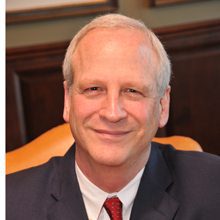
By Alan Berson
When you hear someone discuss the upcoming election, is your first step to try to figure out if you are talking to a Democrat, a Republican or an Independent? This is the way many of us unfortunately decide whether to even listen. We are polarized at a time when we need to form a national consensus.
What has happened to just being Americans? Where did we misplace the art of compromise? When did we discard the art of seeking out contrary opinions as a source of learning to embrace the theory of what is right instead of who is right? How did we become a nation of ‘knowers’ instead of learners at time when the world, our country and our organizations are changing at an accelerating pace and knowledge has a very short shelf life? Utilizing only what we know binds us to the past; being energized by what we learn creates our future. When did we stop asking questions and/or expecting answers?
Ok, so which political party do I support; some of you are probably asking? That’s the point; I support this country, its place on the world stage and its strength at home. I support the people I see on the streets and in organizations. I teach, at Wharton Executive Education, the principles of leadership conversations, of bringing people together to achieve great goals and grow the potential of everyone around us. For that reason, I suggest we take the following steps between now and casting our votes in the ballot box:
1. Think through what is really important to you in the biggest context possible; this world, our country and our own situations will only get better by focusing on the big systemic issues and by creating the opportunities to improve them.
2. Make a list in order of priority to you, to our nation and your children – which might even be 3 different lists. Ask yourself – “If it is now the year 2015 and I am thrilled what my candidates did to improve our world once they got into office, what is now different, what is better?”
3. Research how your politicians really feel about these big issues – consider going to www.factcheck.org to hear an unbiased analysis of claims made by our politicians.
4. Vote.
After the election:
5. Come together as Americans. Continue to tell office-holders what is expected of them; if you don’t communicate your expectations, they will create their own.
6. Ask yourself what contribution you can make to influence a better process and a better result in the next election and on the issues dear to your hearts.
7. Commit to making that contribution.
8. Keep learning.
Not only can we do this, but we must.
Consider the following Rules of Leadership as you perform the above tasks:
· People Skills Trump Technical Skills; after all, being a leader is about motivating people.
· Be Clear About Your Values; and be willing to respect the values of others.
· Pay It Forward; your rewards will come later and more powerfully than you might expect.
· Compete Vigorously – But With a Long-Term View; build rather than burn relationships
· Think “Yes-And,” not “Either-Or” to achieve more than you currently feel is possible.
In early February, the book LEADERSHIP CONVERSATIONS; Challenging High-Potential Managers to Become Great Leaders will be available wherever books are sold. Learn how to have the leadership conversations that will connect and align us with each other and the future generations to come.
Read Berson’s previous column: Relationships That Work on WashingtonExec.
_____________________________________________________________________________
ABOUT THE AUTHOR
Alan Berson is an author, leadership and change management professor, and an executive coach. Feel free to go to www.pulsepointcoaching.com for more information or email him at alan@pulsepointcoaching.com. He is located in Potomac, Maryland. Excerpts above are from his upcoming book: “LEADERSHIP CONVERSATIONS; Challenging High-Performing Managers to Become Great Leaders” by Alan S. Berson and Richard G. Stieglitz to be published by Jossey-Bass in March, 2013.


